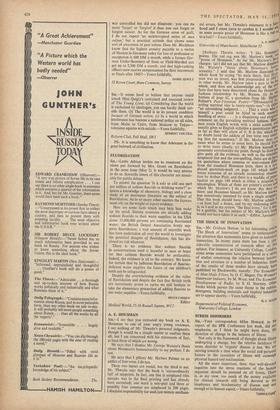A. E. HOUSMAN SIR,—I see that you entrusted my book
on A. E. Housman to one of your angry young reviewers. I say nothing of Mr. Thwaite's personal judgments, though it would be a simple matter to confute them all, but I am concerned with his statements of fact, at least three of which are wrong.
He says that I dismiss Mr. George Watson's thesis about Housman's homosexuality in my preface. I do not.
He says that I pillory Mr. Herbert Palmer as an addict of free verse. I do not.
These two lapses are venial, but the third is not. Mr. Thwaite says that the book is 'extraordinarily full' of misprints. In fact, one line is misplaced (this mistake was in the final printing and has already been corrected), one word is mis-spelt and three or possibly four commas are misplaced in 200 pages. I disclaim responsibility for such last-minute mechani-
cal errors, but Mr. Thwaite's statement is a faig,.e, hood and I crave leave to combat it. I wonder et' to some people praise of Housman is like a red g" to a bull?—Yours faithfully, [Anthony Thwaitc writes : 'I like Hougnalloll poems. The red rag was Mr. Marlow's book,2,0 "praise of Housman." As for Mr. Marlow's lea:A charges: (a) I did not say that Mr. Marlow dismiss; Mr. Watson's "thesis about Housman's lient,he sexuality." I said that Mr. Marlow dismissed s. whole book by saying "its main thesis, that 11(34% man was an invert, was first propounded in 19 ,he in other words, Mr. Marlow takes a part to be whole, and does not acknowledge any of the II' facts that have been discovered about the Houstnat!bl,' Jackson relationship by Mr. Watson. (b) At ,11 bottom of page 62, a quotation from Mr. Her Palmer's Post-Victorian Poetry—"[Housman's1 „,1 setting metrical vice is tumty-tumty-tum"— is eins "an astonishing judgment. . . . That a critic himself a poet could be blind to such maine'ot handling of stress . . . is a disquieting and elocIlle.,5, comment on the prevailing metrical fashion. kle"„d man treats English words with a strict accent, e'.4 usually gives to English syllables a quantitative gets as far as they will allow of it. It is this which 1/ no doubt lured the addicts of free verse into assal ing him for monotony." If Mr. Marlow does ae„ mean what he seems to mean here, he should leer" to write more clearly. (c) Mr. Marlow himself °, genuously corroborates my point, though he does give quite all the evidence. As well as the crucli°4 misplaced line and the mis-spelling, there are at six quotations where commas or semi-colons die! from the standard Housman texts, there is a 10,,les'' placed quotation-mark on page 145 which me` worse nonsense of an already nonsensical observe,: tion by Arthur Platt, and there is a muddle of Plin'r tuation on page 140 which is either a misprintA
e
rrieaningless. Which of these are printer's errors an': which Mr. Marlow's I do not know. But they ar; there; and Housman himself, as Mr. Marlow kne,:t: was notoriously incensed by even a single misPrnt That this book should have—Mr. Marlow admits,',._ —at least half a dozen, and by my reckoning me' is, as I said in my review, "the final irony," for it rail be a quibble, but the subject of Mr. Marlow's WI would not have taken it as such.'—Editor, Spectator'


































 Previous page
Previous page